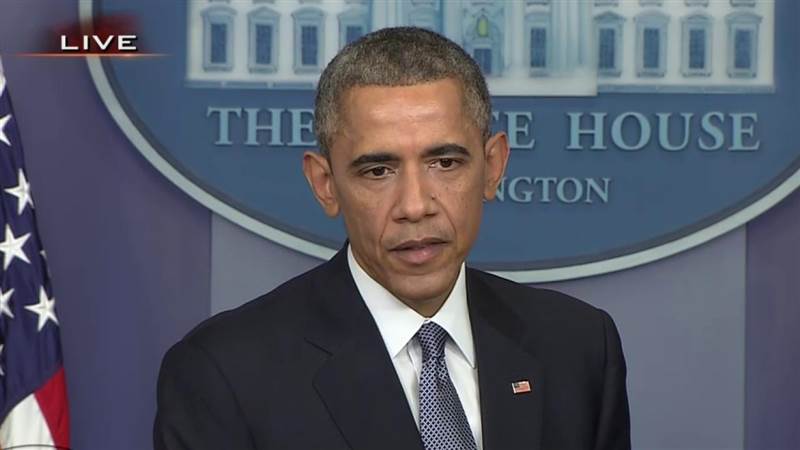Climate Change: Kerry out of touch with realities By Tom Harris
By Tom Harris
U.S. Secretary of State John Kerry was right to tell Indonesian students, civic leaders, and government officials on Sunday that climate change is a serious danger to humanity if not addressed appropriately. While asserting that such changes are “the greatest  threat that the planet has ever seen” was clearly over the top (centuries of asteroid bombardment easily tops climate change impacts), history shows that disaster ensues when societies do not properly deal with climate change.
threat that the planet has ever seen” was clearly over the top (centuries of asteroid bombardment easily tops climate change impacts), history shows that disaster ensues when societies do not properly deal with climate change.
But Kerry ruined his credibility on the issue when he asserted that climate science is “simple”, and “not really a complicated equation.” The secretary even went so far as to say “the science is absolutely certain. It’s something that we understand with absolute assurance of the veracity of that science.”
Trying to unravel the causes and consequences of climate change is arguably the most complex science ever tackled. Professors Chris Essex (University of Western Ontario) and Ross McKitrick (University of Guelph) write in their book Taken by Storm, “Climate is one of the most challenging open problems in modern science. Some knowledgeable scientists believe that the climate problem can never be solved.”
Indeed, the Nongovernmental International Panel on Climate Change demonstrates that much of what we thought we knew about climate is wrong or highly debatable. The science is becoming more unsettled as the field advances.
Kerry’s claim that “97 percent of climate scientists have confirmed that climate change is happening and that human activity is responsible” is also naïve. The figure is based on surveys that asked meaningless questions and only polled inappropriately selected subsets of the scientific community. Massachusetts Institute of Technology meteorology professor Richard S. Lindzen explained, “there is no consensus, unanimous or otherwise, about long-term climate trends and what causes them.”
We do not actually know how much climate will change as carbon dioxide (CO2) levels continue to rise. In fact, the science is so immature that we do not even know whether warming or cooling lies ahead.
That may surprise many people. We have been told for years that “future warming is unequivocal.” Al Gore and others regularly cite the predictions of the United Nations Intergovernmental Panel on Climate Change (IPCC) that a steady rise in temperature is inevitable with increasing CO2 levels.
But nature is not cooperating with such forecasts. While atmospheric CO2 concentrations have increased about 8% over the past 17 years, even the IPCC now acknowledges that planetary temperatures have not risen during this period for reasons they do not understand. They’re also in the dark as to why their Fourth Assessment Report (2007) forecast of “a decline in the frequency of cold air outbreaks in the Northern Hemisphere winter in most areas” have failed so spectacularly in recent years. Across the world, new low temperature and snowfall records are being set with increasing frequency. To think that this is caused by non-existent global warming, as Dr. John Holdren, President Obama’s Science and Technology Advisor asserted last month, begs common sense. Weather phenomena similar to what happened this winter also occurred during the 1962—1963 winter when global cooling was underway.
Of greater concern than hypothetical future warming is the possibility that the past decade’s cold weather records are a harbinger of significant global cooling. Solar scientists are forecasting that cooling is inevitable as the sun weakens into a ‘grand minimum’ over the coming decades.
Solar expert Dr. Habibullo Abdussamatov of Russia’s Pulkovo Observatory near St. Petersburg explained, “from approximately 2014, we can expect the start of the next bicentennial cycle of deep cooling with a Little Ice Age in 2055 plus or minus 11 years.”
The last time the sun was this weak, the Earth was in a particularly cold phase of the Little Ice Age that lasted from about 1350 – 1850, a period of great misery for people around the world.
We won’t know for decades whether Abdussamatov and his peers are right, but history shows that cold periods are far more dangerous than warm times. That is why geologists call past warm epochs ‘optimums’ and cold times ‘dark ages.’ Yet governments across the world are planning only for warming, a relatively benign scenario and one that is appearing increasingly improbable.
So what should be done about climate change given that we don’t know what will happen next?
Kerry was right to say that “the costs of doing nothing far outweigh the costs of investing in solutions now.” But the solutions we need to invest in now should focus on adapting to climate change, not vainly trying to stop it. Adaptation measures should include upgrading our heating, cooling, and irrigation systems, relocating populations living in dangerous areas, burying electrical and communications cables underground, reinforcing infrastructure, and preparing for continuing sea level rise, a phenomenon that has gone on for 10,000 years and is not likely to end any time soon.
To do this we will need massive quantities of inexpensive, high quality, reliable power. Yet in discussing his solutions to these dangers, Kerry promotes wind and solar power, the least reliable and most expensive options available. Moving away from coal and other hydrocarbon fuels to flimsy alternative power sources because of climate concerns would be suicide.
The secretary encouraged his audience to “have a frank conversation about this threat and about what we, as citizens of the world, need to be able to do to address it.” To facilitate such a discussion, Kerry must admit what science and engineering really tell us about these topics, not just what is politically convenient. We have no hope of fulfilling his goal “of leaving our future generations the safe and healthy planet that they deserve” if we do otherwise.
______________________________________________________
Tom Harris is Executive Director of the Ottawa, Canada-based International Climate Science Coalition (www.climatescienceinternational.org).




